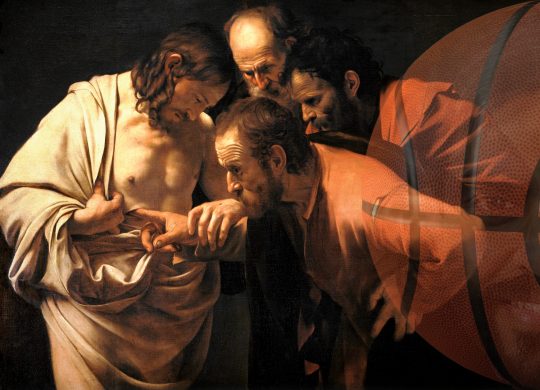Dying!

Does basketball and dying have anything to do with each other? It turns out they do, or so claims “He Dies, He Scores: Evidence that Reminders of Death Motivate Improved Performance in Basketball,” a recent article in Journal of Sport and Exercise Physiology from scientists at the University of Arizona.
These researchers had folks play one-on-one basketball games or take shots at the basket on their own. All had to complete one of two questionnaires beforehand—one asking about participants’ feelings about death, and the other about their feelings about basketball. Those who looked death in the eye showed a 40% improvement in their on-court performance.
In another experiment, some players were challenged to a one-minute round of basket shooting by a researcher who—get this!—was wearing a T-shirt with a skull on it (in other cases, with no such morbid picture on garment). Those who saw the “Death T-shirt” did 30% better than those who didn’t.
This is apparently in line with the benign sounding “Terror Management Theory” that postulates that those who are reminded of their finite end strive to improve their self-esteem, to counteract the anxiety of being aware of their demise. So in the current enterprise, being reminded of their death made the basketballers attempt to raise their self-esteem by performing their best on the court. More shots made, more self-esteem generated.
The researchers think these findings regarding reminders of mortality could be employed as a powerful incentive, not just for sports but for all kinds of other activities—on the court and off the court.
One of the authors of the article, Uri Lifshin:
Your subconscious tries to find ways to defeat death, to make death not a problem, and the solution is self-esteem. Self-esteem gives you a feeling that you’re part of something bigger, that you have a chance for immortality, that you have meaning, that you’re not just a sack of meat.”
“Memento mori,” the ancients used to say: “Remember you have to die!” But this was not to improve performance, but to keep one humble. When a Roman general returned victorious from battle, during his triumphant parade, apparently a slave would be stationed behind the victor, murmuring these words.
Charles Spurgeon preached on this topic in 1860:
The practical effect of a true meditation upon death would be exceedingly healthful to our spirits. It would cool that ardor of covetousness, that fever of avarice, always longing after, and accumulating wealth, if we did but remember that we should have to leave our stores, that when we have gotten our most, all that we can ever inherit for out body is one six feet of earth, and a mouthful of clay. It would certainly help us to set loose by the things which we here possess. Perhaps, it might lead us to set our affections upon things above, and not upon the moldering things below. At any rate, thoughts of death might often check us when we are about to sin.”
So teach us to number our days,
That we may present to You a heart of wisdom.
Psalm 90:12
But the best news about death is that it has been conquered!
“O death, where is your victory, O death, where is your sting?” …
Thanks be to God, who gives us the victory through our Lord Jesus Christ.
1 Corinthians 15:55, 57
Because He lives I can face tomorrow;
Because He lives all fear is gone;
Because I know He holds the future,
And life is worth the living just because He lives.
Bill and Gloria Gaither












 Abe Kuruvilla is the Carl E. Bates Professor of Christian Preaching at The Southern Baptist Theological Seminary (Louisville, KY), and a dermatologist in private practice. His passion is to explore, explain, and exemplify preaching.
Abe Kuruvilla is the Carl E. Bates Professor of Christian Preaching at The Southern Baptist Theological Seminary (Louisville, KY), and a dermatologist in private practice. His passion is to explore, explain, and exemplify preaching.
2 Comments
It’s time to put down our arrogance and pride, it’s time to understand that we are going to die,
it’s time to make ourselves humble before we die, and prepare to see His glory after we die…
Yes, it is.